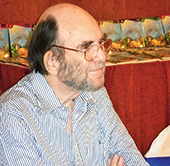 |
| John Mason at the workshop |
They were an attentive class, responding to questions and coming out with enthusiastic suggestions. Their teacher, too, knew how to hold their attention, spicing up his lessons with quips and anecdotes.
The students were all teachers and principals themselves from various city schools who had come to attend the Effective Teaching of Literature Reader Workshop, organised by Oxford University Press at Hotel Hindusthan International on November 11.
 |
 |
| FROM CHINA, WITH A DREAM Students from Shida Fuzhong High School in Kunming, China, at the inauguration of an exchange programme at St. Xavier’s Collegiate School recently. Ten Chinese students were part of the first exchange programme between the two institutes. The eight-day visit came after a batch of 10 Xaverians went to Shida Fuzhong in May 2011. A small programme was organised on the school premises to welcome the Chinese students, who were put up with their “hostel family”. The programme was presided over by Father K.K Devasy, the principal of St. Xavier’s Collegiate School. Others present included Father Sebastian James, the school’s vice-principal, Tian Yuncan, the vice-principal of Shida Fuzhong, Madan Saraf, the principal of School of Chinese Language, and Noomi Mehta, the secretary of ALSOC. The chief guest for the occasion was Trinamul Rajya Sabha MP and an old boy of the school, Derek O’Brien. He urged the exchange students to “try the food and walk the streets and enjoy the city”. (Right) Indian and Chinese students dance the bhangra at the farewell of the weeklong exchange programme. “A friendship between us and the Chinese students was forged over yummy chicken rolls, a boat ride on the Hooghly and during a six-hour bus ride to Santiniketan,”said Class XI student Bonny Kurran. His peer from China, Cheng Yin Tle, said: “We studied together, danced together, sang together — we forged a friendship.” Pictures by Anindya Shankar Ray and Sayantan Ghosh |
Their teacher was none other than educationist John Mason, the former principal of St James’ School. The event was conducted on the launch of a nine-series textbook, Oxford Gateway Reader, brought out by Oxford University Press.
Written by Ray Mackay and Anna Mackay, the books aim at improving a child’s reading and comprehension skills and encouraging him to read more than just textbooks.
“Pleasure is the main principle behind reading. You can’t tell a child to read unless he enjoys it,” said Mason. And a way to get him hooked on reading is by storytelling.
However, parents often can’t accept the fact that fun activities like storytelling can be part of a school’s curriculum. Mason went on to narrate how irate mothers of kindergarten students had approached him, during his stint at St James’, as he had introduced storytelling as an important part of these children’s daily activity.
“And 18 angry mothers are enough to scare anyone,” he said to a laughing audience, before enumerating how a child should enjoy his reading activity from an early stage.
Mason also explained to teachers how to improve the reading skills of their students. “A poor reader takes in words one at a time rather than in a group. Teachers have to teach them how to read groups of words at a time,” he said. Mason also highlighted some faulty practices, like mouthing words while reading or using fingers to read a line.
“If a child can’t read without using his fingers, it means his reading is faulty,” he added.
According to him, a student often suffers because of inappropriate teaching and a faulty syllabus (that he kept calling the “silly-bus”). He also hoped the school syllabus would be more child-friendly in future and would not distract a student from learning and thinking. “Schools are not teaching their kids to think these days,” he felt.
The educationist summed up that the holistic purpose of literary lessons should be to help a child comprehend better and make the connection. Given the disparity of students in a class, teachers should maintain a portfolio of every child and slow down the process of teaching for some, he added. Mason even recommended “Indianising” some rhymes for better understanding.
The workshop also saw the teachers performing an impromptu play — The Pied Piper of Hamelin — and reading from Tagore’s Kabuliwallah.
chit chat
Expressions on stage
City schools presented a theatre exhibition on November 18 at Weavers Studio. The event was part of a series of programmes organised by International Centre, Calcutta, in association with drama group Theatrician. The theme of the event was: “Role of School Students in Civil Society Actions: Theatrical Expressions”.
The participants, including St Augustine’s Day School, The Heritage School, National Gems Higher Secondary School and Delhi Public School, Ruby Park, showcased original skits. Members of Theatrician guided the students in their effort. The teams were given three topics to choose from.
While St Augustine’s students performed a play on the stress faced by some student-actors before a theatre competition, National Gems presented a colourful and poetic rendition of the pressures in a student’s life.
“That this was not a competition was very refreshing for us. We only had to get our message across,” said a student at National Gems.
Sneha Paul











